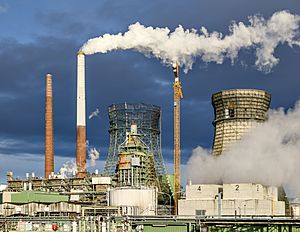Market failure facts for kids

Imagine a game where everyone tries to get what they want, like buying and selling things. This is called a free market. Sometimes, this game doesn't work perfectly for everyone. When a free market doesn't share goods and services in the best way for society, it's called market failure.
This means that resources aren't used as efficiently as they could be. Because of market failure, governments sometimes step in to help fix the problems. They might make rules or offer services to make things fairer or work better for everyone.
Contents
What Causes Market Failure?
Market failure happens for a few main reasons. These problems stop the market from being as fair or efficient as it could be.
Information Problems
Sometimes, people don't have all the facts they need to make good choices. This is called information asymmetry.
- What it means: One side of a deal knows more than the other.
- Example: When you buy a used car, the seller knows more about its problems than you do. You might buy a car that breaks down quickly because you didn't have all the information. This can lead to bad deals.
Externalities: Hidden Costs or Benefits
An externality is when making or using something affects people who are not directly involved in the deal.
- Negative externalities: These are hidden costs.
- Example: A factory makes cool new toys, but its smoke pollutes the air. People living nearby have to breathe bad air, even if they don't buy the toys. The cost of pollution isn't paid by the factory or the toy buyers.
- Positive externalities: These are hidden benefits.
- Example: Your neighbor plants beautiful flowers. You get to enjoy looking at them, even though you didn't pay for them. The benefit of the flowers spreads beyond just your neighbor.
Natural Monopolies: One Big Player
A natural monopoly happens when it's most efficient for only one company to provide a service.
- What it means: It's very expensive to set up the service, so it makes sense for only one company to do it.
- Example: Imagine building all the pipes and wires for water or electricity in a city. It would be a huge waste of money and resources if many companies tried to do this. So, one company usually handles it. Without rules, this one company could charge very high prices.
Public goods are things that everyone can use, and it's hard to stop anyone from using them.
- What it means: Once a public good exists, it's available to everyone, and one person using it doesn't stop others from using it.
- Example: Streetlights are a public good. Once they are on, everyone can see. You can't stop someone from using the light, and your use doesn't make the light dimmer for others. Because it's hard to charge people for public goods, private companies might not want to provide them. This is why governments often pay for things like streetlights, national defense, or clean air.
How Governments Help
When market failure happens, governments often step in. This is called economic interventionism.
- Making rules: Governments can make laws to control pollution from factories.
- Providing information: They can require companies to share more details about their products.
- Offering services: Governments can provide public goods like roads, parks, or education.
- Controlling prices: For natural monopolies, governments might regulate how much the company can charge.
By doing these things, governments try to make the market work better for everyone. They help ensure that resources are used fairly and efficiently, even when the free market can't do it alone.
See also
 In Spanish: Fallo de mercado para niños
In Spanish: Fallo de mercado para niños
 | Janet Taylor Pickett |
 | Synthia Saint James |
 | Howardena Pindell |
 | Faith Ringgold |

